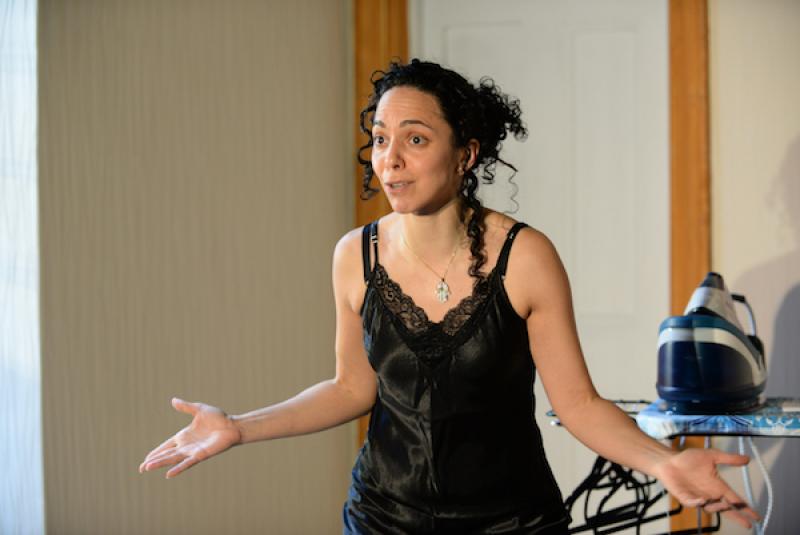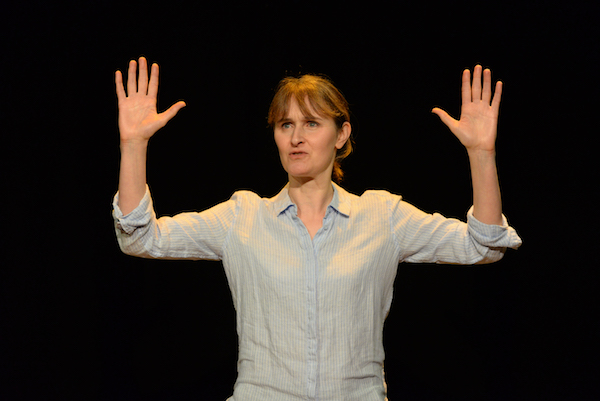Female Parts: Shorts, Hoxton Hall review - women speak out | reviews, news & interviews
Female Parts: Shorts, Hoxton Hall review - women speak out
Female Parts: Shorts, Hoxton Hall review - women speak out
Adulteress, mother and immigrant tell their stories in three monologues

Hot on the heels of International Women’s Day come three monologues written, directed and produced by women showing at Hoxton Hall. It’s kind of a treat, and kind of not.
The current laser focus on gender risks the unwanted side-effect of alienating rather than including, and when an issue becomes so hot it’s hip, surface buzz easily takes over at the expense of meaningful action. Important voices registering dissent, noting difference, flagging up granularity and raising objections are not heard. But the balance between revolution and evolution is perennial and intractable, and the thing about these monologues is that – sadly – the issues are all still live.
Each monologue is told by a women, trapped by who she is or who she has become, or what she has ended up being. Gehane Strehler (main picture) plays a hectic Turkish housewife, locked into her home by her husband as punishment for her infidelity. When the script allows her breath, her performance sings. Rebecca Sire (pictured above) plays a mother from the British middle-class intelligentsia torn apart by public opprobrium and the moral guilt over her son’s conversion to violence as a means of changing society. Her helpless anger and disgust swell throughout a monologue skilfully translated and transposed to a contemporary UK context. Clare Perkins as Ama (pictured below) invites us into her wide-eyed world, speaking in rhyming couplets to her earth-bound daughter while, as the first female Jamaican astronaut on a UK mission, she floats above the earth and ties her sense and tongue in knots.
Gehane Strehler (main picture) plays a hectic Turkish housewife, locked into her home by her husband as punishment for her infidelity. When the script allows her breath, her performance sings. Rebecca Sire (pictured above) plays a mother from the British middle-class intelligentsia torn apart by public opprobrium and the moral guilt over her son’s conversion to violence as a means of changing society. Her helpless anger and disgust swell throughout a monologue skilfully translated and transposed to a contemporary UK context. Clare Perkins as Ama (pictured below) invites us into her wide-eyed world, speaking in rhyming couplets to her earth-bound daughter while, as the first female Jamaican astronaut on a UK mission, she floats above the earth and ties her sense and tongue in knots.
 The three women speak about responsibility, love, and conflicting duties. They tell of the tug of expectations between who they should be and who they are expected to be, and eloquently expose the extent to which each gives up parts of herself so that others can thrive. Each is on a quest for appreciation, acceptance, release. But if true equality can be measured by when incompetent women can be promoted with the same alacrity as equally incompetent men, a monologue from a truly callous woman would be the welcome dramatic equivalent.
The three women speak about responsibility, love, and conflicting duties. They tell of the tug of expectations between who they should be and who they are expected to be, and eloquently expose the extent to which each gives up parts of herself so that others can thrive. Each is on a quest for appreciation, acceptance, release. But if true equality can be measured by when incompetent women can be promoted with the same alacrity as equally incompetent men, a monologue from a truly callous woman would be the welcome dramatic equivalent.
Libby Watson’s design is sensitive to the finest detail (note the adapter plug on Zehra’s iron); Sherry Coenen’s lighting is architecturally daring (see especially the light from the window in A Woman Alone) and the staging of The Immigrant is a little delight. The performances are assured. It’s the writing that is so often the weak link: the context in which A Woman Alone takes place overwhelms what is said, The Immigrant could be tightened, and certain parts of A Mother cut altogether.
That said, while it’s a long evening it’s one that commands attention. These are issues that have not yet been exhausted.
- Female Parts: Shorts at Hoxton Hall until 31 March
- Read more theatre reviews at theartsdesk
rating
Explore topics
Share this article
The future of Arts Journalism
You can stop theartsdesk.com closing!
We urgently need financing to survive. Our fundraising drive has thus far raised £49,000 but we need to reach £100,000 or we will be forced to close. Please contribute here: https://gofund.me/c3f6033d
And if you can forward this information to anyone who might assist, we’d be grateful.

Subscribe to theartsdesk.com
Thank you for continuing to read our work on theartsdesk.com. For unlimited access to every article in its entirety, including our archive of more than 15,000 pieces, we're asking for £5 per month or £40 per year. We feel it's a very good deal, and hope you do too.
To take a subscription now simply click here.
And if you're looking for that extra gift for a friend or family member, why not treat them to a theartsdesk.com gift subscription?
more Theatre
 Ghost Stories, Peacock Theatre review - spirited staging but short on scares
Impressive spectacle saves an ageing show in an unsuitable venue
Ghost Stories, Peacock Theatre review - spirited staging but short on scares
Impressive spectacle saves an ageing show in an unsuitable venue
 Hamlet, National Theatre review - turning tragedy to comedy is no joke
Hiran Abeyeskera’s childlike prince falls flat in a mixed production
Hamlet, National Theatre review - turning tragedy to comedy is no joke
Hiran Abeyeskera’s childlike prince falls flat in a mixed production
 Rohtko, Barbican review - postmodern meditation on fake and authentic art is less than the sum of its parts
Łukasz Twarkowski's production dazzles without illuminating
Rohtko, Barbican review - postmodern meditation on fake and authentic art is less than the sum of its parts
Łukasz Twarkowski's production dazzles without illuminating
 Lee, Park Theatre review - Lee Krasner looks back on her life as an artist
Informative and interesting, the play's format limits its potential
Lee, Park Theatre review - Lee Krasner looks back on her life as an artist
Informative and interesting, the play's format limits its potential
 Measure for Measure, RSC, Stratford review - 'problem play' has no problem with relevance
Shakespeare, in this adaptation, is at his most perceptive
Measure for Measure, RSC, Stratford review - 'problem play' has no problem with relevance
Shakespeare, in this adaptation, is at his most perceptive
 The Importance of Being Earnest, Noël Coward Theatre review - dazzling and delightful queer fest
West End transfer of National Theatre hit stars Stephen Fry and Olly Alexander
The Importance of Being Earnest, Noël Coward Theatre review - dazzling and delightful queer fest
West End transfer of National Theatre hit stars Stephen Fry and Olly Alexander
 Get Down Tonight, Charing Cross Theatre review - glitz and hits from the 70s
If you love the songs of KC and the Sunshine Band, Please Do Go!
Get Down Tonight, Charing Cross Theatre review - glitz and hits from the 70s
If you love the songs of KC and the Sunshine Band, Please Do Go!
 Punch, Apollo Theatre review - powerful play about the strength of redemption
James Graham's play transfixes the audience at every stage
Punch, Apollo Theatre review - powerful play about the strength of redemption
James Graham's play transfixes the audience at every stage
 The Billionaire Inside Your Head, Hampstead Theatre review - a map of a man with OCD
Will Lord's promising debut burdens a fine cast with too much dialogue
The Billionaire Inside Your Head, Hampstead Theatre review - a map of a man with OCD
Will Lord's promising debut burdens a fine cast with too much dialogue
 50 First Dates: The Musical, The Other Palace review - romcom turned musical
Date movie about repeating dates inspires date musical
50 First Dates: The Musical, The Other Palace review - romcom turned musical
Date movie about repeating dates inspires date musical

Add comment